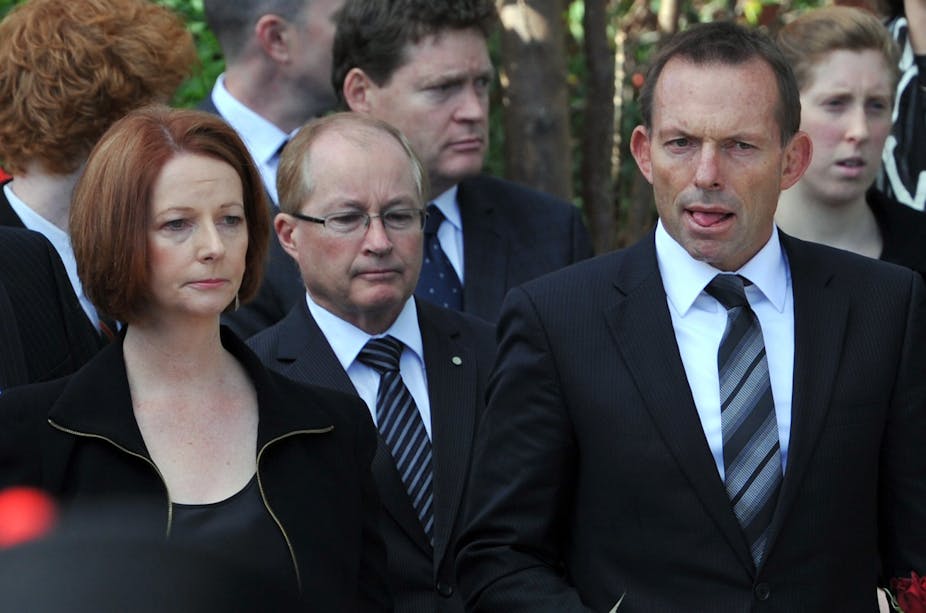Both Julia Gillard and Tony Abbott have staked their political futures on their climate policies. So perhaps they should also be asking what the hallmarks are of a climate leader?
The German political scientist Max Weber once asked what kind of leaders should be allowed to put their hands on the wheel of history.
For Weber, political leaders must be able to unite an ethic of conviction with an ethic of responsibility.
Power for power’s sake without a passionate commitment to a broader purpose is vulgar and vain, while acting with a right intention cannot suffice if the practical consequences of policies are at odds with political convictions.
Put simply, both Abbott and Gillard fail the Weber test.
Abbott now concedes the climate science and the need for a policy response, but his conviction is weak.
And while his “direct action” policies are in keeping with his convictions, they are unlikely to achieve even the modest policy targets that he nominally shares with the government.
The Prime Minister is also in trouble.
She has struggled to convince the electorate of her climate conviction or her policies, having previously ruled out a carbon tax in her election campaign.
Under Gillard, “the greatest moral challenge of our generation” has shrivelled in response to the fear campaign mounted by the opposition. Instead, Julia has announced that Australia does not wish to be a leader, but nor does it wish to be left behind.
Her government accepts the climate science, and acknowledges the narrow window available for effective action, yet its targets bear little relationship to what is required to reduce the risks of climate dangerous change. Its primary message is one of reassurance and appeasement.
No wonder, then, that “a great big tax on everything” seems like an adequate counterargument. And if the government is talking up a compensation package, the public has reason to believe that this big tax on everything must be going to bite.
Weber also argued that political leadership is not a vocation for saints, dreamers, the faint-hearted, or those who are primarily preoccupied with their “impression” on the public.
He recognised that political leaders of consequence must be courageous, honest and cool-headed but that these virtues will not get the leader very far without good communication skills.
Leaders (even perverse ones) are nothing without followers, and it is here that Tony Abbott has excelled.
Climate leaders need three aptitudes if they are to prevail over this opposition.
First, a climate leader must be able to communicate the risks of failing to take timely action. If citizens cannot understand the seriousness of the problem, they cannot be mobilised to support early, concerted action. But the tone should be measured, rather than shrill.
Constant reference to ever more spectacular climate disasters has been criticised as a form of “climate porn” – it is secretly thrilling but ultimately distancing and debilitating because it reduces the audience to a passive spectator overwhelmed by the scale of the problem.
Talking up climate catastrophe is similarly unproductive when it is linked with small-action repertoires such as planting a tree or changing light bulbs. The point is not to play on people’s fear or sense of guilt but rather explain how individual actions are collectively useful if supported by public policies and infrastructural investments that make sustainable behaviour easy rather than heroic.
Second, scientific and technical language doesn’t inspire people to action. Martin Luther King did not preach that he had a series of targets for reducing the percentage of racism over the next 50 years. He inspired others with a vision of the future.
Science and politics are quite distinct realms. A political leader must construct a bridge from the former to the latter. Laypeople are more interested in grasping the meaning of such knowledge for social action, including how it measures up against their own beliefs, values, identities and everyday lives.
Third, a political fixation with technological solutions carries with it certain moral hazards. It avoids questions of distributive justice (who gets what, when and how?) as well as communicative justice (who decides?).
Technology is a means, not an end, so the push for technological innovation must be woven into a broader narrative about human flourishing.
So what kind of narrative should climate leaders be giving us?
The dominant political ideology of our age – neoliberalism – understands strong mitigation targets as a constraint on economic and political autonomy.
This constraint frame contains a deep-seated anti-ecological and anti-social bias because it privileges those among our existing generations who benefit from, yet deny, the unelected risks they impose on others.
A new narrative must be able to show that increasingly ambitious mitigation commitments are a necessary condition for freedom and mutual flourishing.
The answer to the meaning of life is not “less carbon”.
Rather, reducing carbon emissions is something that is necessary so we can all achieve other and better ends.
The sooner we start hearing that from our leaders, the better our grip will be on the wheel of history.

